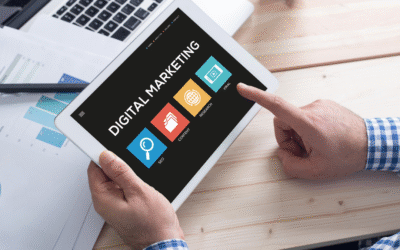In today’s hyper-connected world, digital marketing is no longer a luxury—it’s a necessity. Whether you’re a small business owner or part of a large corporation, establishing a strong online presence is critical to your success. However, with the vast array of digital marketing tools, platforms, and strategies available, it can be overwhelming to know where to start and what you truly need to succeed.
This article will break down the digital marketing essentials you need to thrive online, helping you build a robust strategy that drives traffic, engagement, and conversions.
1. A Well-Designed, Mobile-Friendly Website
Your website is the cornerstone of your digital marketing efforts. It’s where potential customers learn about your brand, browse your products or services, and make purchasing decisions. A well-designed, mobile-friendly website is essential for providing a positive user experience and converting visitors into customers.
Why It Matters:
- First Impressions: Your website often serves as the first point of contact between your brand and potential customers. A professional, easy-to-navigate website creates a positive first impression.
- Mobile Traffic: With more than half of all web traffic coming from mobile devices, having a mobile-responsive website ensures you don’t miss out on this significant audience.
- SEO Benefits: A mobile-friendly website is favored by search engines like Google, improving your chances of ranking higher in search results.
Action Steps:
- Focus on User Experience (UX): Ensure your website is easy to navigate, with clear menus, fast loading times, and intuitive design.
- Optimize for Mobile: Use responsive design to ensure your website looks and functions well on all devices, including smartphones and tablets.
- Clear Call-to-Actions (CTAs): Place clear and compelling CTAs throughout your website to guide visitors toward taking desired actions, such as signing up for a newsletter or making a purchase.
2. Search Engine Optimization (SEO)
SEO is the practice of optimizing your website and content to rank higher in search engine results pages (SERPs). Higher rankings lead to increased visibility, more traffic, and ultimately more conversions. SEO is a long-term strategy that requires ongoing effort, but it’s essential for driving organic traffic to your site.
Why It Matters:
- Increased Visibility: SEO helps your website appear in front of potential customers who are actively searching for products or services like yours.
- Cost-Effective: Unlike paid advertising, organic traffic driven by SEO doesn’t require ongoing costs, making it a cost-effective strategy for long-term growth.
- Credibility and Trust: Websites that rank highly on search engines are often perceived as more credible and trustworthy by users.
Action Steps:
- Conduct Keyword Research: Identify the keywords and phrases your target audience is searching for and incorporate them naturally into your content.
- Optimize On-Page Elements: Ensure your website’s title tags, meta descriptions, headers, and image alt texts are optimized with relevant keywords.
- Build Quality Backlinks: Earn backlinks from reputable websites to improve your site’s authority and search engine ranking.
3. Content Marketing
Content marketing is about creating and distributing valuable, relevant content to attract and engage your target audience. This can include blog posts, articles, videos, infographics, eBooks, and more. High-quality content not only helps establish your brand as an authority in your industry but also drives traffic and leads.
Why It Matters:
- Audience Engagement: Valuable content keeps your audience engaged, encouraging them to return to your site and share your content with others.
- SEO Benefits: Regularly publishing fresh, relevant content can improve your website’s SEO, helping you rank higher in search results.
- Lead Generation: Content marketing is a powerful tool for generating leads, as it allows you to provide value in exchange for contact information, such as through gated content.
Action Steps:
- Create a Content Calendar: Plan your content in advance to ensure consistency and alignment with your marketing goals.
- Focus on Quality Over Quantity: Prioritize creating high-quality content that provides real value to your audience rather than churning out content for the sake of it.
- Promote Your Content: Use social media, email marketing, and SEO to promote your content and reach a wider audience.
4. Social Media Marketing
Social media platforms offer a powerful way to connect with your audience, build brand awareness, and drive engagement. Whether it’s Facebook, Instagram, LinkedIn, or Twitter, social media marketing allows you to reach your audience where they spend their time online.
Why It Matters:
- Brand Visibility: Social media increases your brand’s visibility, allowing you to reach a larger audience and attract potential customers.
- Customer Engagement: Social media provides a platform for real-time interaction with your audience, helping you build relationships and foster loyalty.
- Targeted Advertising: Social media platforms offer advanced targeting options, allowing you to reach specific demographics, interests, and behaviors.
Action Steps:
- Choose the Right Platforms: Focus on the social media platforms where your target audience is most active.
- Engage Regularly: Post regularly and interact with your audience through comments, likes, shares, and direct messages.
- Utilize Paid Advertising: Use social media ads to reach a broader audience and drive traffic to your website or landing pages.
5. Email Marketing
Email marketing remains one of the most effective digital marketing channels for nurturing leads, building relationships, and driving conversions. With a targeted email list, you can send personalized messages that resonate with your audience and encourage them to take action.
Why It Matters:
- Direct Communication: Email allows you to communicate directly with your audience, delivering personalized content straight to their inbox.
- High ROI: Email marketing consistently delivers one of the highest returns on investment (ROI) of any digital marketing channel.
- Lead Nurturing: Email campaigns can be used to nurture leads over time, guiding them through the sales funnel and toward conversion.
Action Steps:
- Build Your Email List: Encourage website visitors to subscribe to your email list by offering valuable incentives, such as discounts or free resources.
- Segment Your Audience: Group your subscribers based on their interests, behaviors, or demographics to deliver more relevant content.
- Automate Your Campaigns: Use email marketing automation to send timely, personalized messages that align with your audience’s journey.
6. Pay-Per-Click (PPC) Advertising
PPC advertising, such as Google Ads, allows you to place ads on search engines and other platforms, paying only when someone clicks on your ad. PPC is an effective way to drive targeted traffic to your website quickly, especially when combined with other digital marketing strategies.
Why It Matters:
- Immediate Results: Unlike SEO, which can take time to show results, PPC delivers immediate visibility and traffic.
- Targeted Reach: PPC allows you to target specific keywords, demographics, and geographic locations, ensuring your ads reach the right audience.
- Measurable Results: PPC campaigns are highly trackable, allowing you to measure performance and adjust your strategy in real-time.
Action Steps:
- Conduct Keyword Research: Identify high-intent keywords that are relevant to your business and target them with your PPC campaigns.
- Set a Budget: Determine your daily or monthly budget and allocate it based on your campaign goals and expected ROI.
- Optimize Your Ads: Continuously test and optimize your ad copy, targeting, and landing pages to improve performance and maximize ROI.
7. Analytics and Reporting
To succeed in digital marketing, it’s essential to track and analyze the performance of your campaigns. Analytics and reporting tools provide insights into what’s working and what’s not, allowing you to make data-driven decisions and continuously improve your strategy.
Why It Matters:
- Informed Decisions: Analytics help you understand your audience’s behavior, preferences, and interactions with your content, enabling you to refine your approach.
- Optimize ROI: By tracking key performance indicators (KPIs), you can identify areas for improvement and optimize your campaigns for better results.
- Continuous Improvement: Regular reporting allows you to monitor progress over time and make adjustments as needed to stay on track with your goals.
Action Steps:
- Set Up Tracking Tools: Use tools like Google Analytics, SEMrush, and social media analytics to monitor the performance of your digital marketing efforts.
- Identify Key Metrics: Focus on the metrics that align with your goals, such as website traffic, conversion rates, and customer acquisition costs.
- Regularly Review Reports: Schedule regular reviews of your analytics reports to assess performance and identify opportunities for improvement.
Conclusion
Digital marketing is essential for any business looking to succeed online, but it requires a strategic approach and the right tools to be effective. By focusing on the essentials—such as a well-designed website, SEO, content marketing, social media, email marketing, PPC, and analytics—you can build a comprehensive digital marketing strategy that drives traffic, engagement, and conversions.
Remember, digital marketing is an ongoing process that requires continuous learning, adaptation, and optimization. Stay committed to your goals, track your progress, and adjust your strategies as needed to stay ahead in the competitive online landscape.









